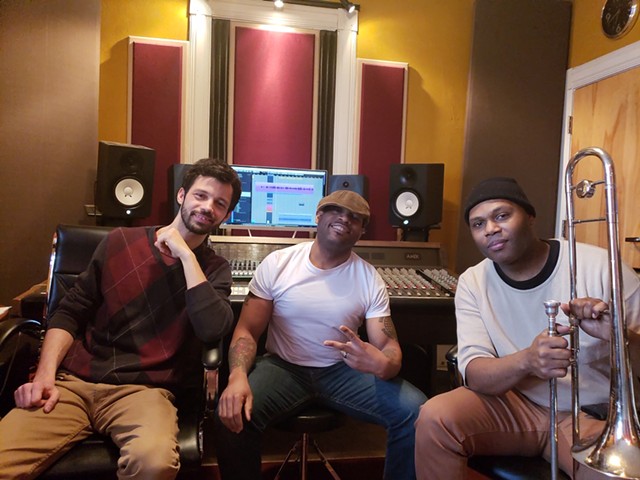The cobbler's children often have no shoes, as the adage goes. For the local instrumental quartet MotherFather, that proverb helps explain why its debut album took seven years to be released despite the fact that the group has almost unfettered access to a top-flight recording studio.
Bassist Brian Scheffer and guitarist Nelson Jones are co-owners of Firebrand Studio, where they record and engineer albums for a bevy of local and national bands including Skin Tags, Little Big Bangs and Smile Empty Soul. But owning a studio is as much a business as it is an artistic endeavor, so MotherFather's members had to wait while the studio's daily operations (and the demands of adulthood) took over.
"That was part of the insane timeline for this record. We started it a long time ago," says Scheffer, who is not a founding member of the band but took over bass duties a few years ago and assisted with recording throughout. "Those guys started playing in 2011 and we started laying the groundwork for the album in 2012. Nelson lived in L.A. for a while and everyone in the band but me has had multiple children, so we were hanging it up for a while."
Recently, however, the clouds parted and the quartet had time to finish the album, which was released in February. The self-titled debut is a pristine-sounding document of the band's post-rock inclinations, where Jones' and Eli Hindman's guitars duel in melodic and textural counterpoint through songs that can recall math-rock intricacies as easily as the swelling grandeur of Explosions in the Sky. Behind the guitars, Scheffer and drummer Tim Hardy lock in to corral the shifting tides of the songs.
Scheffer cites bands like Mogwai and Russian Circles as a commonality among the members, and as a recording engineer he personally holds Steve Albini's work, both as a producer and member of Shellac, in high esteem. Post-rock, for as dodgy as the term can be, is still the easiest way to describe the landscape-like compositions MotherFather creates.
"It's probably the best, most apt description," Scheffer says of post-rock. "I think because it is kind of a niche thing, embracing that has helped us find our way into some things we wouldn't have otherwise."
Like most genres, post-rock is a slippery one to nail down, but MotherFather's mix of traditional rock & roll instrumentation and tonality gets fine-tuned in this setting, especially with the absence of vocals. Dynamic shifts can feel seismic while structural movements are often glacial; everything feels heightened, dosed with drama and in search of some cosmic payoff.
"There's a lot more construction that has to go into something like this," Scheffer says. "A lot of the songs are pretty simple when you break it down; literally, one song on the record is the same chord progression from start to finish, but it's all the little nuance that we try to work on a lot. You end up playing it five different ways, or accenting something a different way with different dynamics."
Sometimes that repetition is the point, Scheffer says.
"The song 'Kingdom' on the record, that intro is very repetitive, but it's sort of a payoff for the build of the heavy part," he notes. "We intentionally want to lull people into a point where they look at their watch and say, 'When are we gonna get to the next part?' It's kind of the bait and switch."
On a song like "Creep," which closes out the record, the band spends nearly ten minutes on a circular chord progression, one that isn't particularly inventive or boundary-breaking in its voicing or construction. But over time the cumulative effect of the song's slow crescendo — dotted with the requisite rock moves of distortion and increasingly flurried drum fills and less typical accents, like a keening harmonica — takes on the form of a mantra.
"We are a pretty loud band, and I think sonics is important in a band like this too," Scheffer says. "That's something that we strive for; making sure that we're dialed in and finding the sounds that we like."
Of course, finding that right sound is a luxury you have when you own a studio and have access to closets full of gear. But as MotherFather prepares to play more local shows (including sets on Saturday, April 13, at Foam and Sunday, April 14, at the Firebird), Scheffer is glad to have the record out in the world after a long gestation.
"It's hard to be finished," he says. "Usually a project is finished when you run out of time or money. That contributes to the insane timeline: When we're in here with no deadline and no pressure to finish anything, it's easier to want to keep tinkering away."






